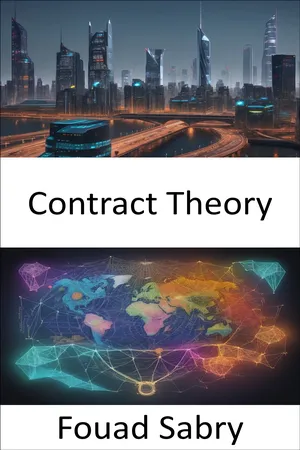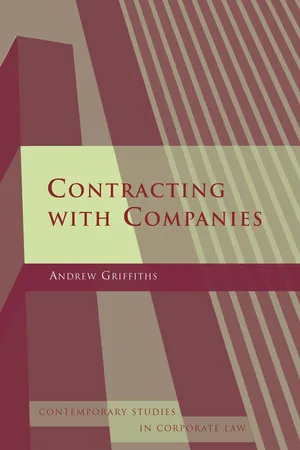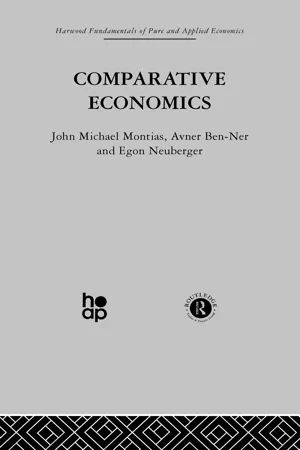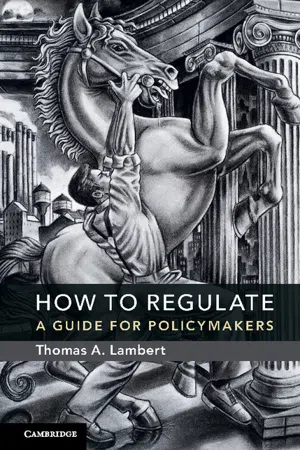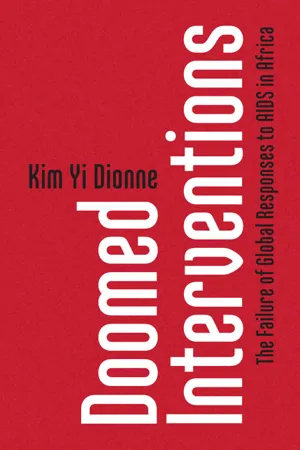Business
Agency Problems
Agency problems refer to conflicts of interest that arise between principals (such as shareholders) and agents (such as company executives) when the agents' actions may not align with the best interests of the principals. These problems can occur due to information asymmetry, differing risk preferences, and the separation of ownership and control in a business. Resolving agency problems is crucial for ensuring effective corporate governance.
Written by Perlego with AI-assistance
Related key terms
1 of 5
7 Key excerpts on "Agency Problems"
- eBook - ePub
Contract Theory
Mastering Contracts, Unveiling the Secrets of Economic Exchange
- Fouad Sabry(Author)
- 2023(Publication Date)
- One Billion Knowledgeable(Publisher)
Chapter 11: Principal–agent problem
The principal–agent problem is the conflict of interests and priorities that arises when one person or organization (the "agent") acts on behalf of another (the "principal") (the "principal").This relationship is frequently observed between corporate management (agent) and shareholders (principal), elected officials (agent) and citizens (principal), and brokers (agent) and markets (buyers and sellers, principals). In each of these situations, the principal must consider whether the agent is acting in his or her best interest. Related to the principal-agent problem are the notions of moral hazard and conflict of interest.The principal–agent problem typically arises when two parties have different interests and asymmetric information (the agent has more information), such that the principal cannot directly ensure that the agent is always acting in their (the principal's) best interest, especially when activities that are useful to the principal are costly to the agent and when it is costly for the principal to observe certain aspects of what the agent does.The agency problem can be exacerbated when an agent represents multiple principals (see multiple principal problem).Multiple mechanisms may be employed to align the agent's interests with those of the principal. Employers (principal) can align worker interests with their own through piece rates/commissions, profit sharing, efficiency wages, performance measurement (including financial statements), the agent posting a bond, or the threat of termination of employment.The agent is expected to pursue the principal's interests, but when those interests diverge, a dilemma arises. The agent possesses resources that the principal lacks, such as time, knowledge, and expertise. However, the principal does not possess complete control over the agent's ability to act in their best interests. In this scenario, the theory posits that the agent's actions are diverted from pursuing the principal's interests and are instead motivated to maximize their own benefit. In the case of a dual sequence of relationships, for instance, citizens or voters rely on the elected politicians to fulfill their responsibilities by designing a system that ensures their health and financial security. Each citizen is a cog in the machine that is society, and if everyone ignored the operation of each and every entity in the system, society would never advance. However, the minister of health cannot be responsible for overseeing each and every internal operation of each public institution; bureaucrats are in charge of managing these institutions. However, when the seed of corruption is planted, the entire system is disrupted because the agent no longer serves the principal's interests. Beyond economics and institutional studies, the theory now encompasses all contexts of information asymmetry, uncertainty, and risk. - eBook - PDF
- Andrew Griffiths(Author)
- 2005(Publication Date)
- Hart Publishing(Publisher)
The agency problem is a form of opportunism that encompasses shirking, but also takes into account the fact that agents have an enhanced scope for acting contrary to the best interests of their principal if they have discre-tionary power vested in them. The internal organisation of a company’s management structure has to contend with the fact that the interests of the An Economic Framework for Analysis 57 139 Actual authority refers to an agent’s power to bind a principal by virtue of due authori-sation by the principal. An agent’s power to bind the principal may, however, be expanded by rules of law that enable the agent to bind the principal without being duly authorised to do so such as under the doctrine of ostensible authority. See F Reynolds, Bowstead & Reynolds on Agency (London, Sweet & Maxwell, 2001) 17th ed (‘Bowstead & Reynolds’) at Art 1 and the discussion of the ‘concepts of power and authority’ in B Markesinis and R Munday, An Outline of the Law of Agency (London, Butterworths, 1998) 4th ed (‘Markesinis & Munday’) at 1–11. 140 On attitudes towards risk, see generally Cooter & Ulen at 50–3. 141 See generally M Jensen and W Meckling, ‘Theory of the Firm: Managerial Behaviour, Agency Costs and Capital Structure’ (1976) 3 Journal of Financial Economics 305 and E Fama and M Jensen, ‘Agency Problems and Residual Claims’ (1983) 26 Journal of Law & Economics 327. company (and through the company, its shareholders), its board and the agents within its management structure are not aligned, and may in fact diverge sharply. The costs attributable to the agency problem, including the costs of devices used for reducing or combating its effects, have been termed ‘agency costs’. - eBook - ePub
- A. Ben-Ner, J. Montias, E. Neuberger(Authors)
- 2013(Publication Date)
- Routledge(Publisher)
Consider now the common situation where several principals have to deal with several agents. (Proprietary or employee-owned firms may have several owners and creditors, stakeholder or fiduciary firms may have many controlling donors, government-owned firms may be subject to control by several agencies, and workers may be the subordinates of several superiors of equal rank.) The objectives of principals may diverge because they do not have the same time horizon or time discount, they face different tax rates, some may be relatively more interested in quality than quantity or in wages than working conditions, etc. When their objectives diverge, principals may disagree on the contract offered to agents. They may also disagree on the choice of the organization’s structure.Another problem stems from individual incentives for free ridership in the exercise of control over agents. Each principal may expect others to commit resources for control, especially when individual returns are small in comparison to the cost of control. On the other hand, if all principals engage in control, there is likely to be considerable duplication of effort.The principal-agent problem has been typically cast with the agent in the role of the ‘villain’ who shirks and hides his activities from the principal. However, moral hazard and adverse selection problems may also affect the behavior of principals, and may also occur in the relations of agents with other agents and of principals with other principals. While the agency problem is usually formulated as the choice of the organizational structure that best promotes the interests of the principal, this focus may be unrealistic in situations where agents have sufficient countervailing power to alter the organizational structure set by principals. The conventional formulation of the principal-agent relationship commonly ignores the strategic nature of the interaction between principals and agents. Hence, while the principal-agent relationship is a convenient and very useful vehicle for introducing important ideas regarding behavior in organizations, it describes formally only one slice of organizational realities. We now turn to a more general analysis of organizational practices and relations. - eBook - PDF
How to Regulate
A Guide for Policymakers
- Thomas A. Lambert(Author)
- 2017(Publication Date)
- Cambridge University Press(Publisher)
Fin. Econ. 305, 309 (1976). What Are Agency Costs? 95 preventing themselves from misusing their principals’ resources, and (3) the residual allocative inefficiency that occurs when agents still act unfaithfully. 4 As long as there are agency relationships (and there always will be, given the tremendous value such relationships create), there will be some agency costs. Our concern is with unwarranted agency costs – i.e., those that could be cost- effectively reduced. symptoms/disease Given the definition of agency costs, it should be obvious what their adverse symptoms are. Business firms and other principals spend gobs of money on monitoring. They hire accountants and lawyers, provide costly ethics training, and set up expensive reporting systems and internal controls. Employees and other agents, seeking to establish and guarantee their faithfulness, procure expensive certifications and agree to costly restraints designed to prevent them from misappropriating their principals’ property. Yet, despite all these mon- itoring and bonding costs, some opportunities to create value from principals’ productive resources are still squandered as agents succumb to the temptation to put their own interests first. Most corporate scandals and responses thereto are tales of agency costs. While the adverse symptoms of agency costs are easy to see, the disease that causes them is perhaps less apparent. On first glance, one might assume that the problem is just an externality. The separation of ownership and control means that the agent who controls productive resources doesn’t bear the immediate costs of her decisions about how they should be used. Most of the loss from picking a less valuable resource use over the one that would maximize value is experienced by the principal, the owner of the resources. Much of the benefit of that pick, though, may inure to the agent. - Stewart Clegg, James R. Bailey, Stewart R Clegg, James Bailey(Authors)
- 2007(Publication Date)
- SAGE Publications, Inc(Publisher)
Examples include employees shirking, free-riding behavior in groups, managerial misbehav-ior, and professional-client relationships. Such situa-tions are also called agency relationships and are the main focus of principal agent theory. One individual (the agent) acts on behalf of another (the principal) and is supposed to advance the principal’s goals. The moral hazard problem arises when agent and principal have different individual objectives and the principal cannot control the agent’s actions. These difficulties often arise because monitoring actions or verifying reported information is costly or impossible. Those costs are described as monitoring costs. Thus, moral hazard occurs if three conditions are met. First, there must be a potential divergence of interests between individuals. Second, there must be some transaction between these individuals that activates their divergent interests. Third, and critically important, it must be difficult for the involved individuals to determine whether the terms of the agreement have been followed. The doctor-patient relation is often cited as a notori-ous case of hidden action. The doctor is the agent who chooses actions affecting the welfare of the principal (the patient). Because the doctor has a superior knowl-edge, the patient cannot check if the actions of the doctor are as diligent as they could be. This is compli-cated by the fact that not only the actions of the doctor, but also other aspects influence the well-being of the patient, so that the patient cannot conclude to what extent the actions of the doctor have been appropriate. Therefore, moral hazard is the result of information asymmetry in uncertain situations. The opportunistic scope of action in such cases causes so-called agency costs, which reduce the efficiency of economic transac-tions. Agency costs are shared by agent and principal and consist of the agent’s guarantee costs, the princi-pal’s monitoring costs, and a remaining welfare loss.- eBook - PDF
Doomed Interventions
The Failure of Global Responses to AIDS in Africa
- Kim Yi Dionne(Author)
- 2017(Publication Date)
- Cambridge University Press(Publisher)
Principal–Agent Framework 43 Mathauer and Imhoff (2006) find that nonfinancial incentives and human resource management tools play an important role in increas- ing motivation of health professionals. And a study in Mali found that increased salary was a distant second to “feeling responsible” as an important motivating factor to health workers (Dieleman et al., 2006). Agents have personal tastes for some policies and not others. Thus, I expect personal taste for a particular intervention will motivate agent effort. For example, we might expect an agent who is living with HIV to give greater priority to implementing an AIDS intervention, than, for example, implementing an intervention against climate change. Like- wise, we should expect an agent more affected by AIDS to give greater priority to AIDS interventions than an agent less affected by AIDS. 6 Relatedly, we could imagine an agent who has never had a personal experience with AIDS or who thinks AIDS is not a priority issue to have little preference in particular for HIV/AIDS interventions. Principal–Agent Problems: Adverse Selection and Preference Misalignment Principal–agent problems are the challenges inherent in delegating tasks to agents. The principal–agent problems that can lead to agency loss include moral hazard, adverse selection, and preference misalign- ment. Moral hazard refers to the problem principals face in being able to keep their agents honest and diligent. 7 Because a principal cannot know for sure to what extent an agent is productive, the prin- cipal will rely on proxy measures like quality of reports, timeliness, and diligence; the principal’s reliance on proxy measures incentivizes the agent to redirect efforts toward the proxy measures (Moe, 1984, 755). Although I cannot rule out the potential for moral hazard, such problems did not feature prominently in my observations of AIDS interventions in Africa. - eBook - PDF
Corporate Governance
Values, Ethics and Leadership
- R. I. Tricker(Author)
- 2019(Publication Date)
- Gower(Publisher)
We show below that an explanation of why and how the agency costs generated by the corporate form are bora leads to a theory of the ownership (or capital) structure of the firm. Before moving on, however, it is worthwhile to point out the generality of the agency problem. The problem of inducing an “agent” to behave as if he were maximizing the “principal’s” welfare is quite general. It exists in all organizations and in all cooperative effo rts-at every level of management in firms,10 in universities, in mutual companies, in cooperatives, in governmental authorities and bureaus, in unions, and in relationships normally classified as agency relation-ships such as are common in the performing arts and the market for real estate. The development of theories to explain the form which agency costs take in each of these situations (where the contractual relations differ significantly), and how and why they are bora will lead to a rich theory of organizations which is now lacking in economics and the social sciences generally. We confine our attention in this paper to only a small part of this general problem -the analysis of agency costs generated by the contractual arrangements between the owners and top management of the corporation. Our approach to the agency problem here differs fundamentally from most of the existing literature. That literature focuses almost exclusively on the norma-tive aspects of the agency relationship; that is how to structure the contractual relation (including compensation incentives) between the principal and agent to provide appropriate incentives for the agent to make choices which will maximize 10As we show below the existence of positive moaitoring and bonding costs will result in the manager of a corporation possessing control over some resources which he can allocate (within certain constraints) to satisfy his own preferences.
Index pages curate the most relevant extracts from our library of academic textbooks. They’ve been created using an in-house natural language model (NLM), each adding context and meaning to key research topics.
